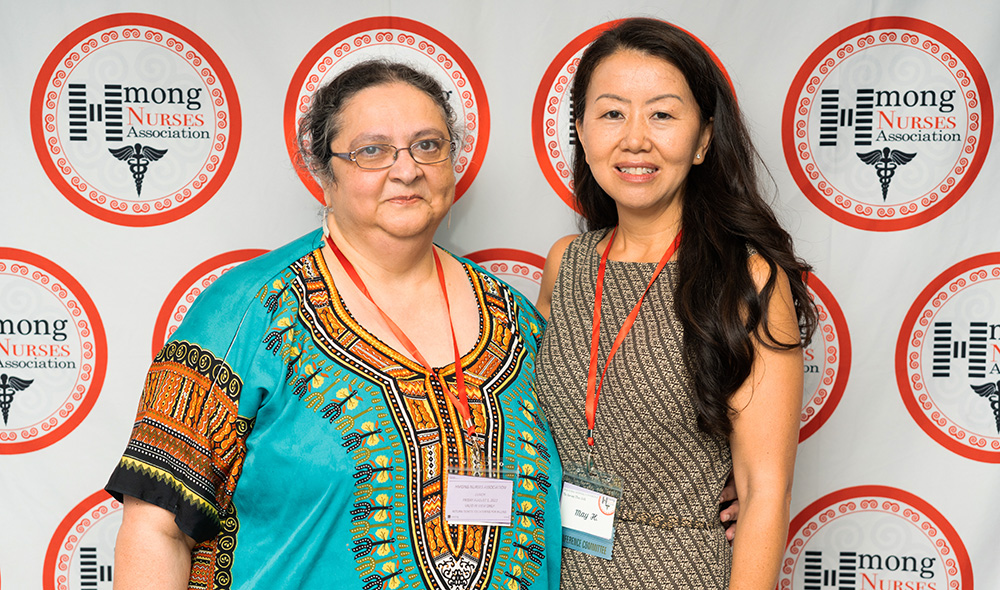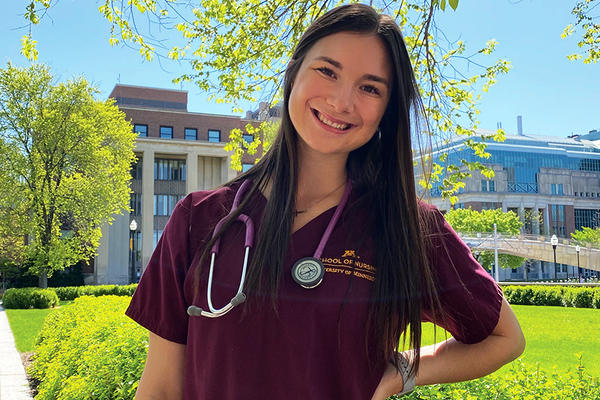Alum May Hang chairs first Hmong Nurses Association conference
CTSI grant funds pilot study conducted in partnership with faculty
October 25, 2022
Brett Stursa

Associate Professor Rozina Bhimani and Alum May Hang received an inaugural Clinical and Translational Science Institute Community Partnership Grant to conduct a needs assessment at the first-ever Hmong Nurses Association Conference.
May Hang, DNP ’19, APRN, FNP-BC, a graduate of the University of Minnesota’s Doctor of Nursing Practice program, joined the Hmong Nurses Association (HNA) for support and leadership opportunities.
This summer, she chaired the first HNA National Conference and partnered with Associate Professor Rozina Bhimani, PhD, DNP, APRN, CNP, CNE, CRRN, to complete a needs assessment at the conference.
“I am interested in mentoring diverse nursing students, as I also faced much adversity, overcoming barriers in my pursuit of higher education, social justice and representation in health care,” says Hang. “So, for me being involved with HNA is the perfect opportunity.”
HNA formed in 2012 in response to a lack of representation of Hmong in the health care profession.
The vision for the two day conference, held Aug. 5-6 in St. Paul, was to provide information about Hmong culture, beliefs and practices related to health and illness, provide strategies to help close the gap in health care disparities, and offer sessions to sharpen nursing skills when providing care for the Hmong community.
They designed the conference to support self-healing and increase Hmong nurse resiliency. “The conference provided Hmong nurses an opportunity to come together to identify critical issues facing the Hmong community due to the pandemic and existing health disparities in our society, which are impacted by social, political and workforce issues,” says Hang.
CTSI awards Community Partnership Grant
The conference served as a venue to collect Hmong nurses’ stories, insights and feedback for a needs assessment to understand any disproportionate effects of COVID-19 in the Hmong community and identify culturally appropriate interventions.
“Hmong nurses working in all settings — outpatient, in patient, and public health — relayed stories of Hmong patient isolation, breech of cultural practices and values, trauma related to physical disability of long hauler syndrome and mental anguish resulting in grief and loss,” says Hang.
Hang and Bhimani received an inaugural Clinical and Translational Science Institute Community Partnership Grant for the pilot study.
Both Hang and Bhimani serve as nurse practitioners at NorthPoint Health and Wellness Center, which is a federally qualified health center located in north Minneapolis. Bhimani also served as Hang’s adviser for her DNP scholarly project, which involved developing a smoking cessation program within NorthPoint.
“This was a golden opportunity to collect information about how COVID has impacted nurses and how it has affected cultural practices,” says Bhimani, who developed a survey for the needs assessment and will complete the data analysis.
“We are looking at long-term engagement. We hope to design an intervention to bridge the suspected gap in cultural practices caused by COVID,” says Bhimani. “When we talk about equity and social justice we really need to not only talk about it but we need to meaningful engage in that work. That’s why I feel very lucky to be invited into this space so we can work together to benefit the community.”


